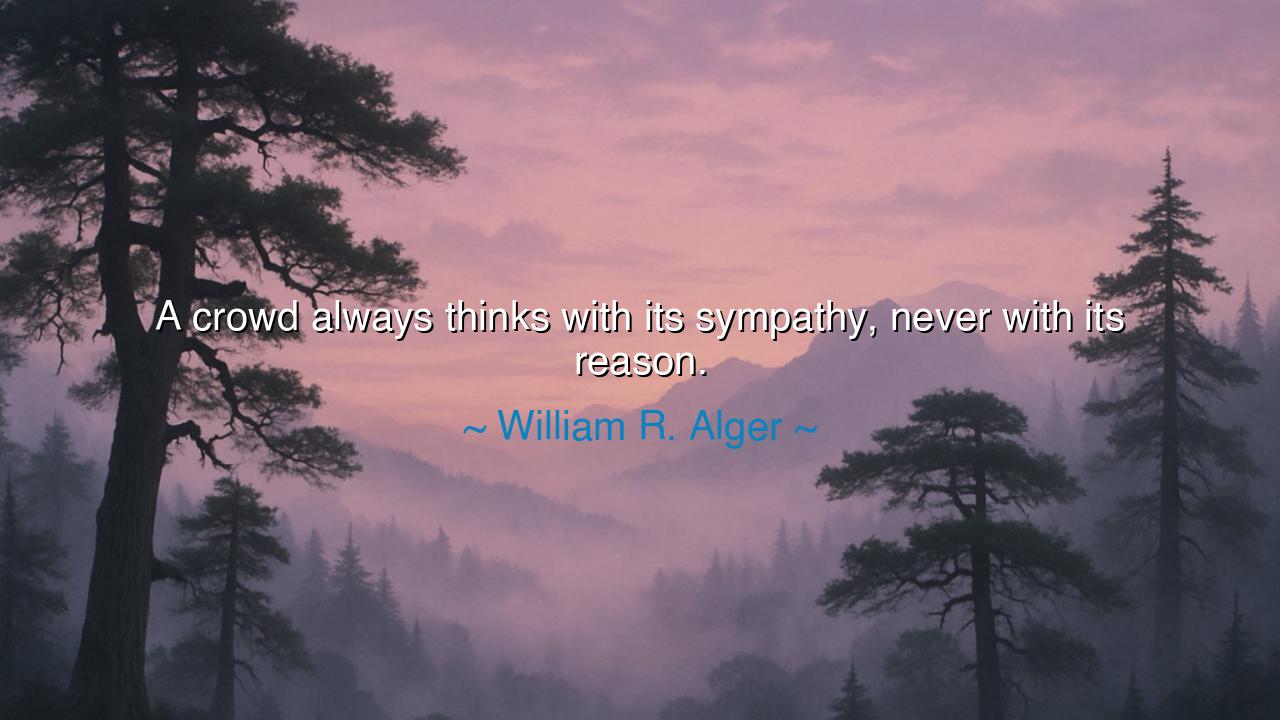
A crowd always thinks with its sympathy, never with its reason.






"A crowd always thinks with its sympathy, never with its reason." – William R. Alger. These words, uttered by a wise man of the past, reverberate through the annals of time, speaking to us of the perilous nature of collective judgment. Behold, the crowd, vast in number, sways and shifts like the waves of a mighty sea. Yet, beneath the surface of this great ocean of humanity, there stirs a tempest of emotion that blinds the mind to reason. The great tide of sympathy, that warm, stirring current, often carries the crowd far from the shores of rational thought and into the realms of unthinking impulse.
What is it that drives the collective heart of a crowd? It is not the calm, steady hand of logic, nor the cool, penetrating light of wisdom. No, it is the fiery, urgent rush of sympathy, which wraps its tendrils around the hearts of all who are swept into its embrace. This force, noble in its origins, for it springs from compassion and understanding, can also become a tyrant, ruling the minds of the many with a gentle but unyielding grasp. When a crowd gathers, it does not reason—it feels, it weeps, it rages. And in its fury, it casts aside the delicate balance of reason.
Consider, if you will, the tragic tale of Socrates, the wisest of men, who fell victim to the tide of sympathy that swept through the Athenian crowd. In the court of Athens, where reason should have held sway, it was not logic that triumphed, but the bitter sway of popular opinion. The crowd, moved by the emotions of those who spoke against Socrates, cast aside their reason and delivered their judgment in a frenzy of sympathy. They condemned a man whose only crime was the pursuit of truth. Thus, the great philosopher, the very embodiment of reason, was sacrificed upon the altar of misguided sentiment.
This, dear reader, is the danger of the crowd. It is not that the emotions of the many are evil—they are not. Sympathy is a noble force, one that binds us together in times of grief and joy, of suffering and celebration. But it must not, nay, it cannot, rule alone. For when it takes control, the crowd forgets that reason is the guardian of justice. Reason is the sharp sword that cuts through the fog of emotion, revealing the path that leads to truth. Without reason, the crowd is like a ship without a rudder, tossed and turned by the winds of fleeting sentiment.
Let us also look to history to see how this truth has unfolded in the lives of great men and women. Remember the story of Marie Antoinette, the last queen of France, whose fate was sealed not by the weight of her actions alone, but by the waves of emotion that surged through the hearts of the people. Sympathy, stirred by hunger and hardship, turned into anger, and that anger turned to bloodlust. The revolutionaries, once sympathetic to the plight of the common folk, became blinded by their own fury. Their emotions—untamed, unreasoning—dragged them into the abyss of violence, where reason could not follow. The queen, with all her faults, became the symbol of a regime that had long since lost touch with the needs of the people. And so, in a flurry of emotion, the crowd’s verdict was delivered.
Thus, we learn that sympathy, when untempered by reason, can lead to destruction. It clouds our judgment, distorts our perception, and drives us to act in ways that, in the calm light of reason, we might never have considered. And yet, the lesson does not lie in the condemnation of sympathy itself, but in the careful balance we must maintain. We must not forsake our compassion for others, nor the warmth of our shared humanity. But we must be vigilant, ever-watchful, to ensure that reason remains our guiding star.
The lesson for us, noble reader, is clear: in the tumult of the world, amidst the chaos of emotions, we must strive to cultivate reason in our hearts. In moments of great passion, when the crowd around us cries out in fury or in love, we must stand firm. Like the wise of old, we must anchor ourselves in the calm waters of logic and reason, remembering that sympathy is a force to be cherished, but not a master to be obeyed. Let us not be swept away by the tides of unreasoning emotion, but let us hold steady to the course that reason charts for us.
In our lives, when we find ourselves surrounded by the voices of the crowd—be it in the clamor of politics, the fervor of social movements, or the rapture of fleeting trends—let us remember the wisdom of this quote. Let us listen to the heart, but let us also listen to the mind. Reason must guide us, for it is in the realm of reason that justice is born. When we temper our sympathy with reason, we become not only wise but just, not only compassionate but thoughtful, capable of seeing beyond the surface to the deeper truths that lie beneath.
So, as we move through this world, let us remember: a crowd may think with its sympathy, but we—we—must think with our reason. And in doing so, we shall lead the way, steady and true, through the tempests of emotion that seek to blind us.






AAdministratorAdministrator
Welcome, honored guests. Please leave a comment, we will respond soon